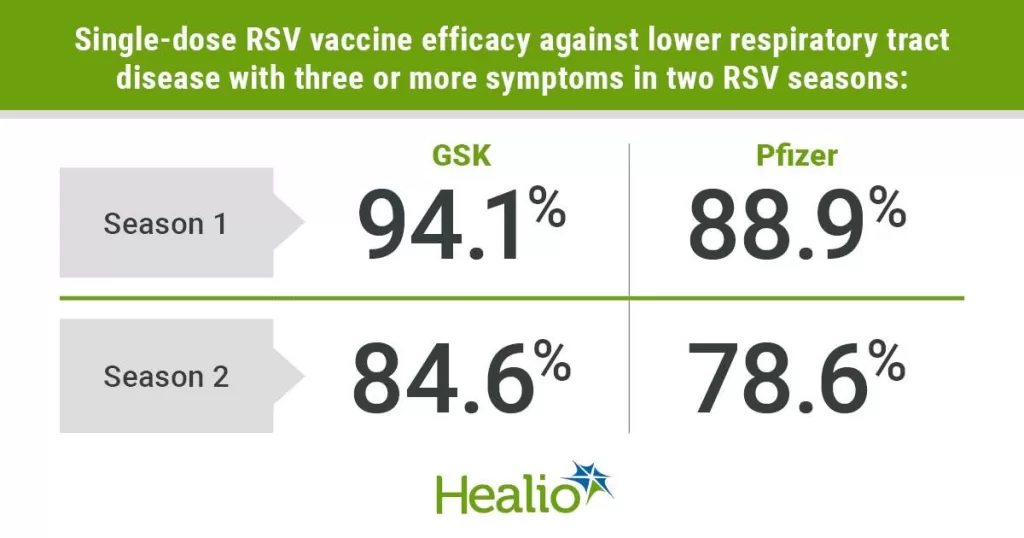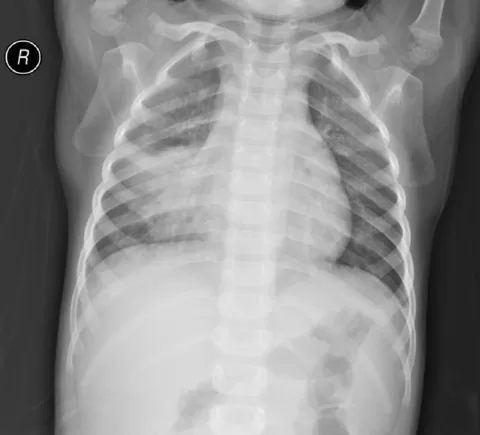RSV vaccination effectiveness has become a pivotal focus in combating respiratory syncytial virus (RSV) among vulnerable populations. A recent study highlights how immunization for seniors significantly reduces RSV hospitalizations, particularly for older adults aged 75 to 79, with a striking 30% reduction in hospital admissions observed. With vaccine coverage in England reaching an impressive 47.4% among eligible individuals by January 2025, the impact of the RSV vaccination program is becoming increasingly evident. This reduction is crucial, as RSV can lead to severe complications in older adults, making effective vaccination strategies essential for enhancing public health. As we delve deeper into the effectiveness of RSV vaccines, it is clear that advancing vaccine coverage is vital to safeguarding our elderly population against this prevalent respiratory threat.
The effectiveness of vaccinations against respiratory syncytial virus (RSV) has garnered much attention, particularly in regard to older populations facing higher risks. With a notable focus on immunization efforts for seniors, recent investigations showcase a significant decline in hospital admissions linked to RSV. As the vaccine reaches broader coverage among older adults, the benefits become more pronounced, emphasizing the urgency of such preventive measures. This history of successful vaccination campaigns underscores the importance of protecting vulnerable groups from severe respiratory illnesses that RSV can cause. Ultimately, these findings reaffirm the critical nature of ensuring high vaccine uptake to reduce the burden of RSV in senior individuals.
The Impact of RSV Vaccination on Hospitalization Rates
Recent studies have confirmed that RSV vaccination plays a crucial role in reducing hospital admissions among older adults. In particular, data from England revealed a significant 30% drop in hospitalizations among vaccinated individuals aged 75 to 79, highlighting the vaccine’s effectiveness in this vulnerable population. Such findings underscore the necessity of increased awareness and favorable attitudes toward immunization for seniors, which can lead to improved health outcomes and decreased healthcare costs.
By analyzing vaccine coverage rates, researchers have observed a steady rise, reaching 47.4% by January 2025 among eligible adults. This upward trend indicates a successful outreach campaign to promote RSV vaccinations, reflecting an increasing recognition of the importance of respiratory syncytial virus prevention strategies. As hospitalizations can have severe ramifications for older individuals, enhancing vaccine uptake remains crucial in managing public health risks associated with RSV.
Understanding RSV: Risks for Older Adults
Respiratory syncytial virus (RSV) poses significant risks, especially for older adults and those with chronic respiratory conditions. Symptoms can range from mild cold-like indications to more severe respiratory distress necessitating hospitalization, making it vital for this demographic to receive vaccines. According to the CDC, even those with pre-existing conditions, such as asthma or heart failure, are at heightened risk for severe RSV outcomes, warranting improved immunization strategies to protect these vulnerable populations.
The increased incidence of RSV hospitalizations during peak seasons emphasizes the importance of vaccination in mitigating these risks. As hospitals often experience surges in patients due to RSV, ensuring higher vaccine coverage among older adults could drastically reduce the strain on healthcare systems. Consequently, public health initiatives should focus on encouraging older adults and their families to prioritize RSV vaccination, especially as these individuals frequently face compounded health challenges.
Boosting Vaccine Coverage Among Seniors
Despite the positive impact of RSV vaccination, vaccine coverage among older adults remains a critical focus for health authorities. By January 2025, the eligible population in England showcased a notable increase in uptake, reaching approximately 47.4% vaccinated individuals. However, continued efforts are necessary to further boost vaccine coverage, ensuring that more older adults receive timely immunizations to protect against RSV hospitalizations.
Health officials are now targeting strategies to enhance access to vaccines and improve public perception regarding their benefits. This includes community outreach programs, education about the dangers of RSV, and addressing any hesitancy surrounding vaccinations. By emphasizing the effectiveness of RSV vaccines and their substantial role in preventing severe health outcomes, the hope is to significantly raise immunization rates among seniors to protect against RSV-related hospitalizations.
Evaluating Real-World Vaccine Effectiveness
Ongoing research into the real-world effectiveness of the RSV vaccination is essential for refining future immunization strategies. Initial findings suggest an impressive 30% reduction in hospitalizations correlating with an anticipated 72% vaccine effectiveness. Such statistics not only validate the importance of vaccination but also initiate a deeper exploration into the long-term benefits and challenges of RSV immunization programs targeted at older adults.
Future studies are planned to further substantiate these findings through comprehensive evaluations and adjusted test-negative case-control studies. As researchers seek to refine these effectiveness estimates, it is crucial to continue monitoring the health outcomes of vaccinated versus unvaccinated individuals. These efforts will contribute significantly to developing robust public health policies that aim to combat RSV complications in older populations.
The Importance of Timely Vaccination
Timely vaccination against RSV is key to protecting older adults, especially as they approach peak RSV season. The data indicates that among those vaccinated, the rate of hospitalizations drops significantly, suggesting that immunization just before high-risk periods could provide substantial protection. Older adults are often among the most affected by respiratory illnesses, making it imperative that they receive RSV vaccines at optimal times.
Health experts advocate for strategic scheduling of RSV vaccines, ensuring that eligible individuals are vaccinated ahead of the RSV season. Coupled with educational initiatives that stress the importance of early vaccination, these strategies could significantly improve health outcomes for older adults during high-risk periods. Efficient and timely immunization will not only safeguard the health of seniors but also alleviate pressure on healthcare facilities burdened by RSV-related hospitalizations.
Policy Implications of RSV Vaccination Rates
The rising trend in RSV vaccination coverage among older adults has profound implications for public health policies. As evidenced by a 30% reduction in hospitalizations, increased vaccination rates can lead to better health outcomes for this vulnerable demographic. Policymakers must recognize the need for continued investment in immunization programs that address RSV, to not only protect individual health but also promote community wellness.
Understanding the effectiveness of RSV vaccination, alongside ongoing research and surveillance, will help shape future directives regarding vaccine availability and outreach efforts. Their findings will inform not just healthcare providers but also governmental bodies as they devise strategies to combat RSV. Advocacy for stronger immunization initiatives will be pivotal in ensuring that older adults have access to essential vaccines, thereby reducing the incidence of RSV-related hospitalizations.
Challenges in Increasing Vaccine Uptake
Despite the benefits of RSV vaccination established in recent studies, obstacles still hinder an increase in vaccine uptake among older adults. Misinformation, accessibility issues, and potential healthcare provider biases may limit outreach efforts. It is vital for public health campaigns to address these challenges head-on, providing factual information regarding the safety and efficacy of RSV vaccines to encourage acceptance.
In addition, understanding the barriers that may prevent older adults from accessing vaccines is essential. Community-level interventions that enhance accessibility, such as mobile vaccination units and local educational efforts, can help. As awareness grows about RSV and its impact, coupled with efforts to enhance vaccine accessibility, the hope is for increased immunization rates that can lead to improved health outcomes for seniors.
Looking Ahead: Future Research Directions
The landscape of RSV vaccination continues to evolve, and future research will play a crucial role in shaping its trajectory. As the interim assessment demonstrates the benefits of vaccination in reducing hospitalizations among older adults, ongoing studies will delve deeper into the long-term effectiveness and safety profiles of the vaccines. Investigators aim to address knowledge gaps and optimize immunization strategies based on evidence from diverse populations.
Moreover, as healthcare systems adapt to meet the needs of aging populations, research will also focus on understanding how best to engage older adults in vaccination programs. This includes exploring their perceptions, preferences, and any barriers they may face. By prioritizing research in these areas, public health organizations can develop comprehensive approaches that enhance vaccine uptake, thereby sustaining a healthier future for seniors at risk of severe RSV.
Boosting Awareness and Education around RSV Vaccination
Raising awareness and educating older adults about the significance of RSV vaccination is vital in promoting higher vaccine uptake. Campaigns that inform about the serious risks associated with RSV for seniors, including the potential need for hospitalization, can empower individuals to seek vaccination. By tailoring educational content to resonate with seniors’ experiences and health concerns, there will be a greater likelihood of positive responses to vaccination recommendations.
Outreach initiatives that leverage community resources and trusted healthcare providers can play a significant role in boosting these efforts. Providing accessible information translated into various formats, including community workshops and digital platforms, can facilitate broader understanding among seniors and their families. As knowledge about the importance of RSV vaccination grows, so too can the intent to vaccinate, ultimately resulting in healthier outcomes for older populations.
Frequently Asked Questions
How effective is the RSV vaccination in reducing hospitalizations among older adults?
Recent studies indicate that the RSV vaccination is highly effective in reducing hospitalizations among older adults. Specifically, a study in England found that there is a 30% reduction in RSV-associated hospital admissions for individuals aged 75 to 79, aligning with an expected vaccine effectiveness of 72%. This highlights the significant impact of RSV vaccination effectiveness in protecting older adults from severe respiratory syncytial virus complications.
What is the current vaccine coverage for RSV among older adults in England?
As of the latest reports, RSV vaccine coverage among eligible individuals in England reached 47.4% by January 2025. This is a promising increase from 35.1% when the vaccination program began, demonstrating the commitment to improving RSV immunization for seniors, particularly those aged 75 years and older.
Who should receive the RSV vaccine to reduce risk of hospitalization?
The CDC recommends RSV vaccination for all individuals aged 75 years and older and for those aged 60 to 74 years who are at increased risk for severe RSV infections. This guidance is crucial for enhancing vaccine coverage and effectiveness in reducing RSV hospitalizations within these at-risk populations.
What have studies shown about the effectiveness of RSV vaccination for seniors?
Studies have shown that RSV vaccination provides significant protection for seniors, with one population-based study indicating 80% effectiveness against RSV-related hospitalizations for adults aged 60 years and older. The ongoing evaluations and real-world effectiveness estimates reinforce the importance of RSV vaccination in safeguarding older adults from serious health outcomes.
How does RSV vaccination impact RSV hospitalizations among high-risk groups?
The impact of RSV vaccination is particularly vital for high-risk groups, such as older adults and those with underlying health conditions. The 30% reduction in hospitalizations observed in individuals aged 75 to 79 years indicates that RSV vaccination is critical in mitigating severe complications associated with respiratory syncytial virus, ultimately improving health outcomes for vulnerable populations.
What future research will refine the estimates of RSV vaccine effectiveness?
Future research will focus on end-of-season evaluations and adjusted test-negative case-control studies to refine real-world estimates of RSV vaccine effectiveness in older adults. These studies aim to provide further insights into the impact of immunization for seniors on reducing RSV hospitalizations and improving overall health outcomes.
| Key Points | Details |
|---|---|
| RSV Vaccination Impact | Significantly reduces hospital admissions in older adults, with a 30% reduction observed in the 75-79 age group. |
| Expected Vaccine Effectiveness | Aligns with an expected vaccine effectiveness of 72%, despite not being a focused effectiveness study. |
| Vaccine Coverage | Reached 47.4% by January 2025 among eligible individuals, indicating good program reach. |
| Future Research | Future evaluations will refine real-world estimates of vaccine effectiveness. |
| Clinical Significance | The vaccination is crucial for high-risk groups, including those over 75, to prevent severe respiratory complications. |
| Recommendations | CDC recommends RSV vaccination for individuals aged 75 and older, and 60-74 with increased risk. |
Summary
RSV vaccination effectiveness has been clearly demonstrated through recent studies focusing on older adults in England. The significant reduction in hospital admissions highlights the importance of RSV vaccination, particularly for those aged 75 and over. With a reported 30% decrease in hospitalization rates and a projected vaccine effectiveness aligning around 72%, the evidence supports ongoing vaccination efforts in this vulnerable population.
The content provided on this blog (e.g., symptom descriptions, health tips, or general advice) is for informational purposes only and is not a substitute for professional medical advice, diagnosis, or treatment. Always seek the guidance of your physician or other qualified healthcare provider with any questions you may have regarding a medical condition. Never disregard professional medical advice or delay seeking it because of something you have read on this website. If you believe you may have a medical emergency, call your doctor or emergency services immediately. Reliance on any information provided by this blog is solely at your own risk.







